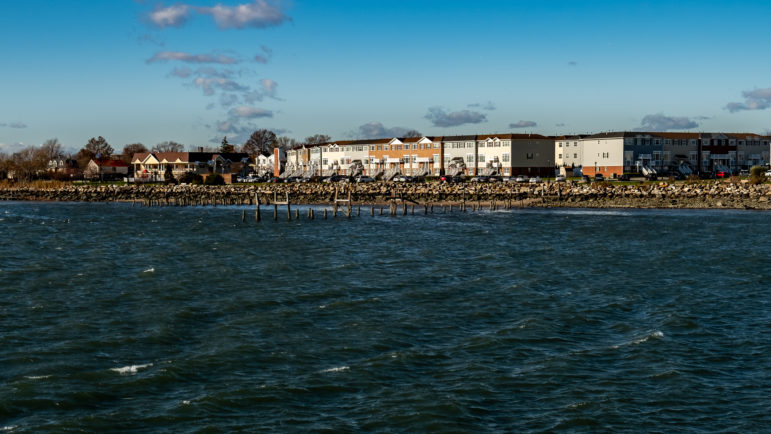The House has passed an updated Water Resources Development Act that the Senate is expected to approve soon. The bill would address major criticisms of a stalled Army Corps of Engineers study of how to protect New York City from rising seas.

The House of Representatives on Tuesday approved legislation that would revamp a controversial, stalled federal study of how to protect the New York City region from the growing threat of sea-level rise.
The updated Water Resources Development Act now goes to the Senate, where it is expected to win approval by year’s end.
Among other things, the law directs the U.S. Army Corps of Engineers to take a different approach in its New York/New Jersey Harbor and Tributaries Study, a $19 million planning project launched in 2016 that aimed to identify the best strategy for reducing the risk of catastrophic flooding in the metropolitan area.
Preliminary conclusions from the study released in 2019 focused on a limited number of options, including massive mid-harbor barriers that would cost billions and take decades to install. Critics of those plans thought they ignored the importance of wetlands restoration and other natural barriers, and focused too much on the threat of catastrophic storm surge while ignoring the less dramatic but more regular risk of sea-level rise and increased inland flooding.
The Corps was supposed to pick its preferred plan of action in March, but the agency suspended the study in February, citing a shortage of funds.
The bill approved by the House this week and expected to sail through the Senate doesn’t restore funding for the study—advocates are hoping the Corps or the incoming Biden administration will find the cash for a restart—but it does revamp the approach the agency is allowed to take. It requires the Corps to consider natural solutions and build plans that address sea-level rise and inland flooding as well as storm surge, and it allows for more community engagement.
“We strongly support how well the bill prioritizes the use of natural and nature-based features that provide flood risk reduction while also providing ecosystem services to communities, such as fish and wildlife habitat, recreational and commercial opportunities and clean water,” wrote the Rise to Resilience Coalition in a letter to Congressional leaders. “We support the effort of the bill to begin to address historical and ongoing flood equity issues for disadvantaged and repetitive loss communities.”
The bill also includes $421 million for habitat restoration at 20 local sites under the Hudson-Raritan Estuary Comprehensive Restoration Plan—part of $9.9 billion in funding for projects around the country.
Riverkeeper praised New York lawmakers for their role in moving the measure along.
“Our sincerest thanks and congratulations to Sean Patrick Maloney and Nydia Velázquez for helping to design this new WRDA bill and to Chuck Schumer and Kirsten Gillibrand for their excellent work to shepherd it forward in the Senate. Thanks to these savvy and dedicated legislative leaders, we can look forward to more creative, comprehensive solutions, more community consultation and a new focus on ecological restoration, as we work to get out in front of the threats posed by climate change. WRDA is simply a huge step forward on these issues,” said Paul Gallay, Hudson Riverkeeper.
Even after Senate passage, this measure will not unfreeze the Corps’ tributaries study. Congress has to actually appropriate the money, and the executive branch’s Office of Management and Budget must then allow spending on the study to resume.
If and when the study does resume, advocates will be keeping watch to make sure the Corps actually delivers the kind of planning and engagement Congress is asking for. Legislation can only dial so far down into the details of an agency’s actions, and the details are what really matter.Still, restarting the Army Corps plan is a key step to improving resiliency along the city’s waterfront, which has been marked by a patchwork approach since Superstorm Sandy made New York’s vulnerability painfully clear. A proposed city zoning revision would permit individual property owners to take steps to shore up their assets, but the city still lacks a comprehensive plan for the inevitable impacts of climate change.









